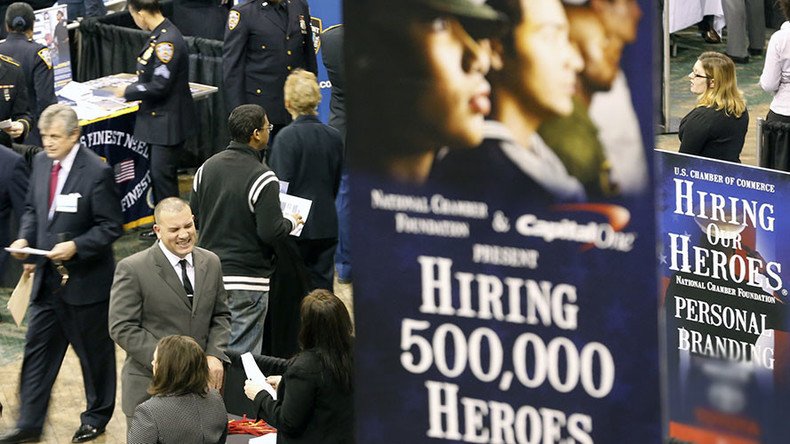'Outraged' Congress may intervene as National Guardsmen ordered to pay back bonuses

Almost 10,000 California National Guard troops have been ordered to repay their recruitment bonuses after an investigation discovered that many of them were ineligible, despite being told otherwise. Lawmakers are trying to block the "disgraceful and insulting" move.
Thousands of guardsmen will have to return at least $15,000 per person, or more, after California National Guard officials were found guilty of mismanaging the program and submitting false claims. Last month, 42 auditors completed reviewing bonus and incentive payments and found that 9,700 members had been improperly awarded the money, the Los Angeles Times reported.
Chief of federal policy for the California Guard, Andreas Mueller, emailed California’s members of Congress on Monday, reminding them that the issue of erroneous reenlistment bonuses paid to thousands of soldiers had been originally brought to the attention of federal lawmakers in 2014, according to the Los Angeles Times.
Mueller also said that California was just “the only state that audited” the payments, leaving open the likelihood that service members in all 49 other states could become impacted by these payback requests as well.
While many state officials have pleaded guilty to making fraudulent claims, it’s the service members who were unknowingly enlisted that are being required to pay back the bonuses, Military.com reported.
The former soldiers have to repay the money to the Pentagon or face interest charges or tax liens. Members of Congress hope to convince the Pentagon to waive the debts, however.
Hotline calls from suicidal veterans went to voicemail – former VA official https://t.co/GgcKvmjJzQpic.twitter.com/Gnji3o9YHe
— RT America (@RT_America) September 27, 2016
“I am outraged that our servicemembers and veterans are being asked to repay bonuses and benefits promised to them when they answered the call to serve our nation,” Representative Julia Brownley, a Democrat representing the 26th District, said in a statement on Monday, adding, “I intend to introduce legislation as soon as Congress returns to waive repayment, and will work with my colleagues to ensure a full accounting of how this mismanagement occurred.”
Brownley is not the only California congressperson with hopes to bring this issue to officials’ attention. Duncan Hunter, a Republican who represents the 50th District, wrote a letter to Defense Secretary Ashton Carter, saying, “It remains my firm belief that even the simple request of asking soldiers to repay money contingent on reenlistment is disgraceful and insulting.”
“In fact, I find it difficult to believe that either you or your leadership team was aware that such a boneheaded decision was made to demand repayment -- and I ask that you utilize your authority to influence a solution, including a possible legislative fix if determined necessary, that's in the best interest of the individuals and families impacted,” Hunter added.
Democratic California Senators Barbara Boxer and Dianne Feinstein also wrote to Defense Secretary Carter to appeal to waive the debts, saying that service members were unaware that their bonuses were fraudulent and had "paid a heavy price for their service — including severe injuries sustained after reenlisting."
Democratic presidential nominee Hillary Clinton joined in, saying in a statement, “We simply cannot allow this type of mistreatment of veterans, for any reason,” NBC reported.
Even officials within the military have supported forgiving the debt. Maj. Gen. Matthew Beevers, deputy commander of the California Guard, told the Times, “We’d be more than happy to absolve these people of their debts. We just can’t do it. We’d be breaking the law.”
Many of the soldiers had no idea that they were not entitled to the payments. Christopher Van Meter, a veteran with a Purple Heart, was prepared to leave the Army after 15 years of service, but changed his mind after learning that reenlisting would net him a $15,000 bonus, he explained to CNN.
“We were in the Iraq and Afghanistan war at the time. And they wanted to keep soldiers in the military,” Van Meter said. However, he was later told that he was not eligible for the bonus that had been used to lure him back into the service.
600k veterans uninsured in 2017 - health researchers https://t.co/aUqU9RkNVppic.twitter.com/0pdoD20Q5Z
— RT America (@RT_America) September 30, 2016
An anonymous service member told Military.com that he had been given a $10,000 bonus to leave the Reserves and join the California National Guard in 2009.
“I served two years in Iraq and then came home in 2011 to find out the [California Army National Guard] did not have the correct paperwork and I was required to pay back the bonus,” he said. Adding insult to injury, the government is demanding repayment of the money it never paid out in the first place.
“They took $3,000 out for taxes but I had to pay back the full $10,000. How do I get that $3,000 back? The CA ARNG says it is not their problem. I have to work with the IRS. This does not sit well with me as they took out that money!” the service member said.
The problem appears to stem from a combination of mismanagement and fraud. Eight current or former California National Guard members, recruiters or recruiting assistants, were charged with fraudulently obtaining recruitment bonuses in 2014, Military.com reported. But even before that, there were signs that something was amiss with the California Guard’s incentives.
In 2011, retired Master Sergeant Toni Jaffe pleaded guilty to filing false claims of up to $15.2 million, according to CNN. Jaffe admitted to submitting claims for members of the California National Guard while knowing that they were ineligible for the bonuses.
Investigators have found that many of the California Guard officials participated in the fraud in order to meet enlistment targets – not unlike the recent Wells Fargo scandal – the Los Angeles Times reported.
Susan Haley, 47, spent 26 years of her life in the Army and was deployed to Afghanistan, where her oldest son lost a leg as a military medic. Since the Guard found that she was improperly awarded $20,500 in bonuses, she now has to pay a quarter of her family’s monthly income to the Pentagon.
“They’ll get their money, but I want those years back,” she told the Times.












